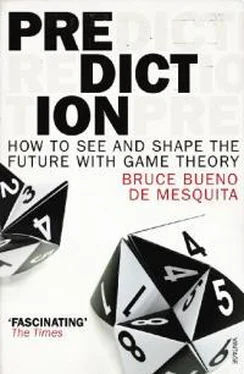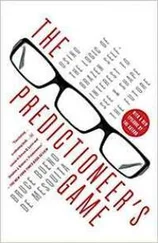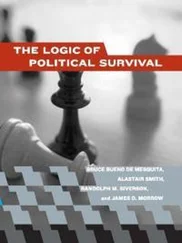About ten years after creating the static version I finally worked out a dynamic model I was happy with. That is the model I’m mostly discussing in this book. Over the past few years I’ve been working on a completely new approach based on a more nuanced game than the one I described back in the third chapter. Preliminary tests of this new model indicate that it not only yields more accurate predictions, but also captures play dynamics more faithfully. As an added bonus, it also allows me to evaluate trade-offs across issues or across different dimensions on a single issue simultaneously. It also gives me the opportunity to assess how each player’s salience and influence changes from bargaining round to bargaining round, something the older model cannot do. I will apply this new model to some ongoing foreign policy crises and to global warming in the last two chapters. That will be my first foray into opening the opportunity to be embarrassed by my new approach.
The process of discovery is never-ending. That’s both the challenge and the excitement behind doing this kind of research: finding better and better ways to help people solve real problems through logic and evidence. Not everyone, though, shares my enthusiasm for this sort of effort at discovery.
Some critics object to predicting human behavior. They worry that government or corporations will misuse this knowledge. They’re concerned about the ethics of reducing people to equations. To me this is an odd set of objections, especially since it comes mostly from people who are unhappy with the quality of government policy choices and with corporate actions to begin with. Some of my academic colleagues particularly object to providing guidance to the intelligence community, the “evil” CIA, on national security matters. They seem to think that the government shouldn’t have the best tools at its disposal to make the best choices possible. I don’t share that view. If we want better decisions from our government, we ought to be willing to help it improve its decision making.
Yes, there is always a risk that any tool will be misused. But science is about understanding how the world works. Different people have different personal views about what will make the world a better place, and it’s the job of officials and citizens to regulate unethical uses of information. Further, it is the responsibility of each of us as individuals to withhold our expertise when we think its use will make the world, or our little part of it, a worse place.

I turn down clients when I don’t want to help them achieve their goals. Many years ago, for example, I was approached by someone claiming to represent the Libyan government. The person who contacted me wanted me to figure out how to facilitate overthrowing the Egyptian government then led by Anwar Sadat. The contact proposed flying me to Geneva, Switzerland, to avoid the possibility of the United States government or some other government being able to subpoena the results of my then very primitive modeling effort. I was offered a million dollars for my trouble. There is no way for me to know whether this approach was authentic or a hoax, although it certainly seemed real. I declined and immediately contacted people in the U.S. government to alert them to my experience.
Several years later I was contacted by yet another person with an unsavory proposal. This person represented himself as an agent for Mobutu Sese Seko of Zaire. Mobutu’s hold on power had become tenuous. His economy was doing poorly, his soldiers were becoming agitated, and his loyal followers were becoming shaky because he was known to have a terminal illness. They were presumably worried about who would protect them and take care of them financially when he was gone. The contact person wanted to know if I could work out how to salvage Mobutu’s control over Zaire and offered a success fee of 10 percent of Mobutu’s offshore financial holdings. I know this sounds hard to believe, but it happened, and it was before unscrupulous Nigerians had worked out their famous Internet bank scams.
Mobutu at the time was reputed to be worth somewhere between $6 billion and $20 billion. If this had been for real and if I could have engineered his continuation in office until he died peacefully or chose to step down, and if I had been willing to do so, I could have been paid an unbelievable fortune. But even if the fortune had been believable, the answer would still have been the same. As in the alleged Libya offer, I said no without a moment’s hesitation. I was confident that Mobutu’s difficulty was an analytic problem with a solution, but no amount of money could have justified my intervention. My main concern was that I would be on the radar screen of people I really preferred not to know about me. And once again I contacted people in the U.S. government to alert them to the situation.
Of course, my personal judgment about who to do business with might differ from someone else’s judgment. I couldn’t see any justification for helping anyone topple Sadat. Here was a man who had put his life at risk—and would tragically lose it—in a sincere and successful effort to advance the cause of peace. Mobutu’s case could be seen as (ever so slightly) more complicated. There was a slender ethical case to be made on Mobutu’s behalf. While it did not appeal to me, one could easily have argued that whoever came after Mobutu might be even worse. Back then, and even immediately after his overthrow, it wasn’t clear that the Congo was moving in a better direction. Still, for me the answer was unambiguous. For others—who knows how they would have evaluated the pros and cons of applying insights from science to help or hinder a dictator like Mobutu?
Some of you may think I should not use game theory to help big corporations get good settlements in litigation, especially when their opponents in civil matters may not be able to afford (or choose not to afford) comparable help. Others may think I don’t do enough to help plaintiffs (although my firm is happy to do so; we just aren’t asked very often), or what have you. Still others may subscribe to the lawyer’s dictum: Everyone is entitled to the best defense they can muster. We all have our individual standards about how to use or withhold our knowledge and skills, and that is as it should be.
In the end, I believe advances in scientific knowledge almost always better the human condition. If we turn ourselves into Luddites, we’ll just shift the advantages of knowledge to others. Remember, after Galileo’s persecution by the Catholic Church, physics went into decline in Italy for centuries, until, perhaps, the arrival of Enrico Fermi on the scene. Despite the setbacks in Italy, that didn’t mean research into physics stopped. It moved to Protestant northern Europe, leaving Italy to fall behind. Similarly, efforts to stymie science in China caused that country, once the world’s most advanced in scientific knowledge and discovery, to descend into scientific oblivion. China’s emperors chose to have their people look within themselves rather than at the stars; China is still struggling to overcome the deficit it created for itself. I hope we will not make the same mistake. As for me, I continue to look for ways to improve my understanding of how the world of strategic human behavior works. And that’s central to my motivation to continue learning from past failures.
As I said earlier, and as we’ve seen in this chapter, prediction can look backward almost as fruitfully as it can look forward, providing remarkable insight not only into what happened but also into what might have been. Accordingly, in the next chapter we’ll have some fun with history. We will look at how World Wars I and II might have been avoided, and how Sparta might have prevented its colossal collapse after its stunning victory in the Peloponnesian War. And while everyone knows Columbus sailed the ocean blue in fourteen hundred and ninety-two, what they don’t know is that his experience presents an interesting bargaining problem—one whose outcome explains why Spain said yes and why Portugal (among others) said no, forever changing the course of history. In looking at the past with a game-theory microscope we begin to grasp the logic behind the history we know (and a sense of just how un -inevitable history is) and, sometimes to tragic effect, the missed opportunities for strategic choices that would have altered its course.
Читать дальше












